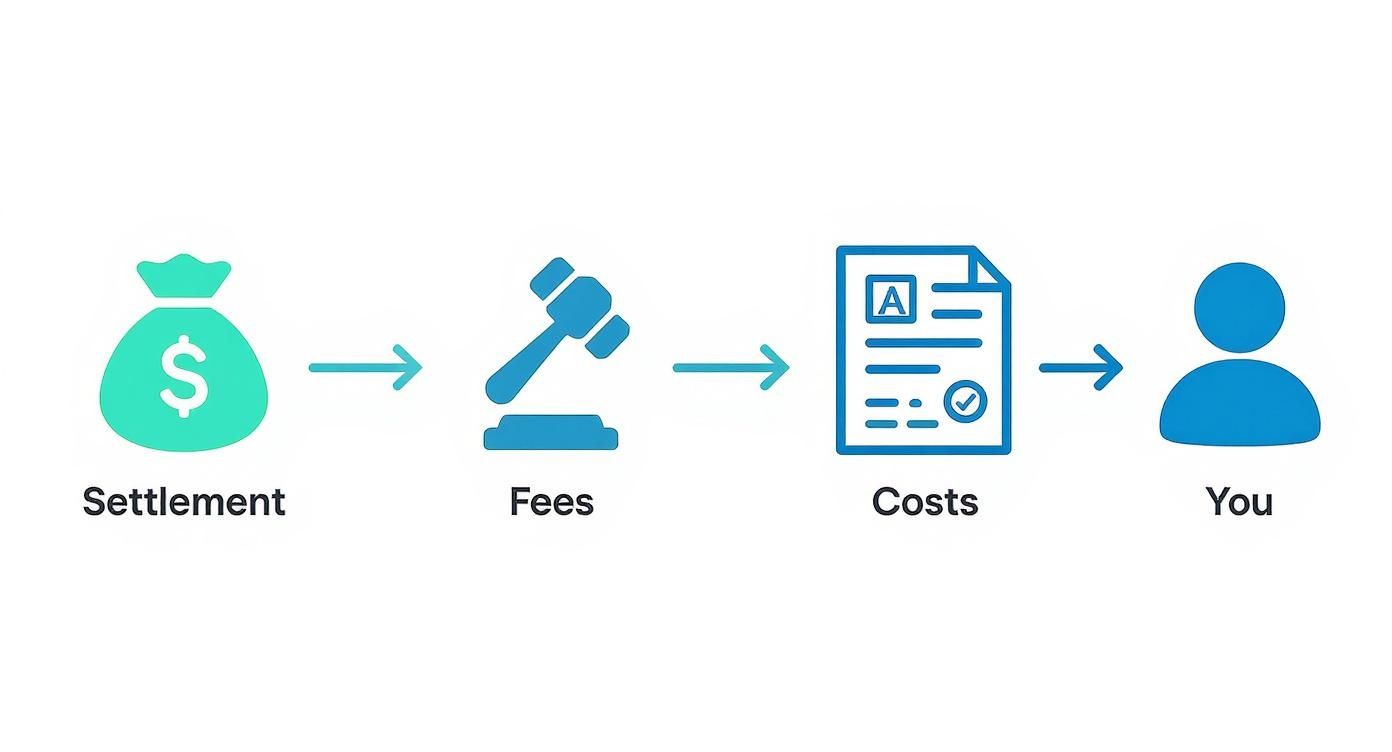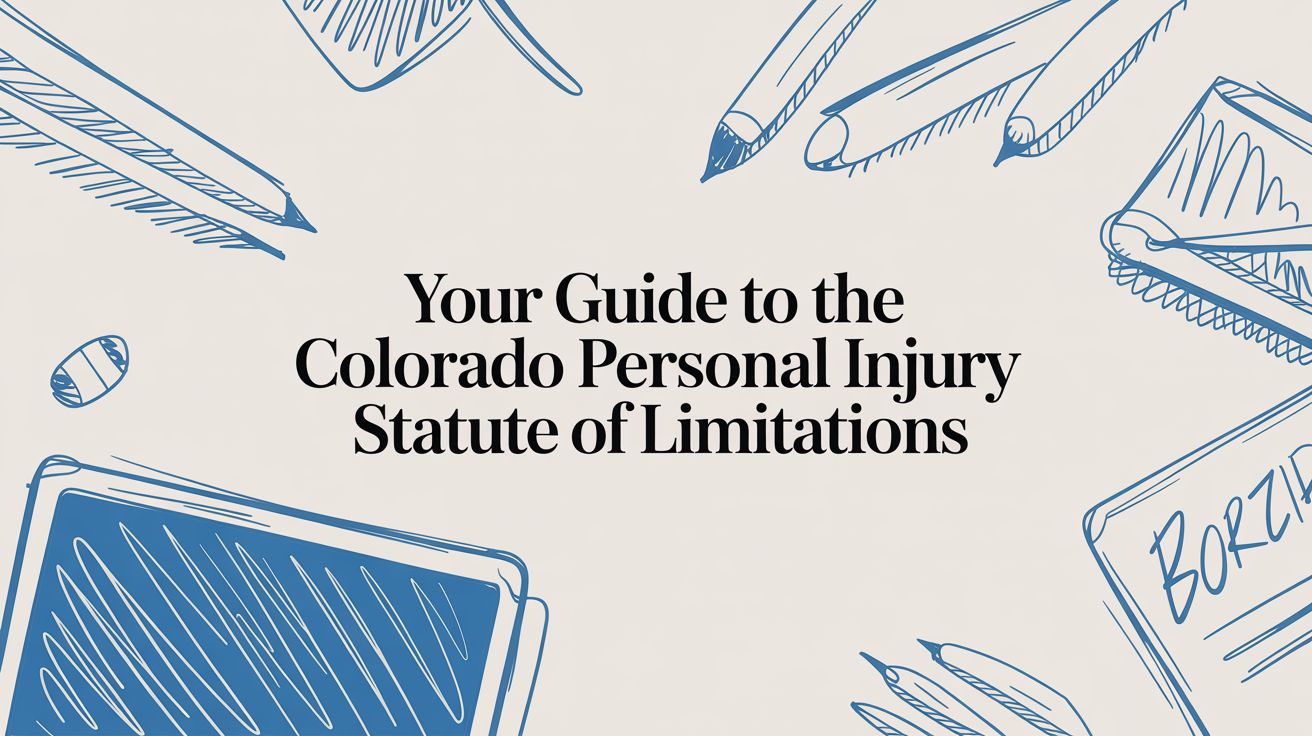Table of Contents
After a serious accident, the thought of paying for a lawyer can be stressful. Fortunately, if you are injured in Denver, Aurora, or anywhere in Colorado, the system is designed to help you. Most personal injury lawyers handle cases on a contingency fee basis.
This arrangement means you pay no attorney fees unless we win a settlement or verdict for you. This guide explains how accident lawyer fees work so you can seek justice without upfront costs.
Key Takeaways
- No Upfront Costs: Personal injury lawyers in Colorado work on a contingency fee basis, meaning you only pay if they recover money for you.
- Standard Percentage: The typical contingency fee is a percentage of your total settlement, usually 33.3% if the case settles before a lawsuit is filed.
- Fees vs. Costs: Attorney fees cover the lawyer's work, while case costs are expenses like filing fees or expert witness payments. Your lawyer should advance these costs for you.
- Free Consultations: Reputable lawyers offer a free, no-obligation meeting to discuss your case and explain their fee structure.
How Do Legal Fees Work After a Colorado Accident?
The fear of legal bills can stop people from getting the help they need after a crash. However, the contingency fee system gives everyone a fair chance against large insurance companies without needing money upfront.
This guide will break down legal fees for accident claims in Denver, Aurora, Colorado Springs, and Fort Collins. We will cover common fee structures and explain the difference between fees and costs, so you can move forward with confidence.

What Is a Contingency Fee Agreement?
A contingency fee is a partnership. Your lawyer invests their time, expertise, and money to build your case without you paying them directly. Their payment is entirely contingent on winning your case.
If your lawyer secures a settlement or wins a verdict, their fee is a pre-arranged percentage of the money they recover. If they do not win, you owe them nothing for their time. This “no win, no fee” model levels the playing field, giving you the power to challenge insurance companies with an experienced attorney on your side.
The Standard Contingency Fee Percentage in Colorado
In Colorado, the industry standard for a contingency fee is 33.3%, or one-third, of the total settlement. This is the typical rate for cases that are resolved through negotiation before a lawsuit is filed.
For example, if your attorney negotiates a $90,000 settlement for your car accident claim, their fee would be $30,000. This structure means your attorney is motivated to get you the best possible outcome. Their success is tied to your success.
When the Percentage Might Change
Not every case settles easily. Some fights require more time, resources, and legal action, which can change the contingency fee percentage. Many fee agreements use a tiered structure, meaning the percentage may increase if your case becomes more complex.
- Filing a Lawsuit: If the insurance company refuses to make a fair offer and your lawyer must sue them, the fee may increase to account for the work of litigation.
- Discovery and Depositions: This evidence-gathering stage involves formal witness interviews, hiring expert witnesses, and reviewing documents.
- Going to Trial: A trial is the most demanding part of the legal process. It requires extensive preparation and courtroom advocacy.
A common agreement might be 33.3% if the case settles before a lawsuit, increasing to 40% if the case enters litigation. This change reflects the greater risk and work the law firm puts into your case. Any potential fee changes will be explained clearly in your written agreement before you sign.
Understanding the Difference Between Fees and Costs
One of the biggest points of confusion is the difference between attorney fees and case costs. While often discussed together, they are two separate things. Understanding this distinction helps clarify how your settlement money is handled.
Attorney fees are what you pay your lawyer for their professional work. This covers their legal expertise, negotiation skills, and the hours spent building your case. Under a contingency agreement, this fee is the agreed-upon percentage of your final settlement.
Case costs, or litigation expenses, are the out-of-pocket funds spent to pursue your claim. At Conduit Law, we advance all these costs for you, so you pay nothing upfront.
Common case costs include:
- Court filing fees
- Medical record retrieval
- Police and accident reports
- Deposition transcripts
- Expert witness fees
These expenses are vital investments that strengthen your case and help us fight for the maximum compensation you deserve. When we secure a settlement, case costs are reimbursed to our firm from the total settlement amount. We provide a detailed breakdown of every cost so you know exactly where the money went.
 Alt text: Denver personal injury lawyer meeting with client in a professional office.
Alt text: Denver personal injury lawyer meeting with client in a professional office.
How the Process Works in Colorado: Your Settlement Payout
A common question is, "If my case settles for $100,000, do I get a check for $100,000?" The answer is no. The total settlement is the starting point. From there, fees, costs, and medical bills must be paid before you receive the final amount.

The Order of Payouts
Settlement funds are paid out in a standard order. First, the attorney’s fee is deducted. Next, the law firm is reimbursed for the case costs it advanced. The final step is to pay any medical providers who have a lien on your settlement.
Let’s use a $100,000 settlement as an example:
- Gross Settlement: The insurance company pays $100,000, which goes into your lawyer's trust account.
- Attorney's Fee: With a 33.3% fee, $33,333 is deducted for legal services.
- Case Costs: If the firm spent $5,000 on costs, that amount is paid back to the firm.
- Medical Liens: If you have $15,000 in outstanding medical bills, your attorney pays these directly from the settlement funds.
- Your Net Recovery: After all deductions, you would receive a check for $46,667.
This process ensures everyone who helped you win your case is paid for their work. Your attorney should provide a detailed settlement statement, or disbursement sheet, that itemizes every deduction so there are no surprises.
What Compensation Covers
When you are injured, the financial impact goes beyond medical bills. A personal injury claim aims to recover compensation for all your losses. Our team fights to secure a settlement that covers:
- Medical Expenses: All costs for treatment, from emergency room visits to future physical therapy.
- Lost Wages: Income you lost while unable to work.
- Future Lost Earnings: If your injuries affect your ability to earn a living long-term.
- Pain and Suffering: Compensation for physical pain and emotional distress.
- Loss of Enjoyment of Life: For the impact your injuries have on your daily activities and hobbies.
When to Call a Lawyer
You should consider calling an attorney as soon as possible after an accident. Insurance companies often try to get you to accept a low settlement offer quickly. An experienced lawyer can protect your rights and handle communications with the insurer.
It is especially important to call a lawyer if:
- You suffered serious injuries.
- The insurance company denies your claim or blames you for the accident.
- Your case involves multiple parties.
- You are unsure about the value of your claim.
Common Mistakes to Avoid
After an accident, certain actions can harm your ability to recover fair compensation. Be sure to avoid these common mistakes:
- Admitting Fault: Do not apologize or accept blame at the accident scene.
- Giving a Recorded Statement: You are not required to give a recorded statement to the other party's insurance company.
- Accepting the First Offer: The first settlement offer is almost always too low.
- Waiting Too Long: Colorado has strict deadlines for filing a claim. Contacting an attorney promptly protects your legal rights.
What to Bring to a Free Consultation
Your first meeting with a lawyer is a chance for you to get answers and for them to evaluate your case. Being prepared can help you make the most of this time.
Try to bring the following items to your free consultation:
- The police or accident report
- Photos and videos from the accident scene
- Contact information for any witnesses
- Your medical records and bills related to the injury
- Information about the other party's insurance
- A list of questions you have about the process and fees
Why Conduit Law
At Conduit Law, we build trust through transparency. We founded our firm on the promise of “No Fees Unless We Win” because your only job should be to recover from your injuries, not worry about legal bills. We serve clients in Denver and across Colorado with upfront communication.
From our first conversation, we will walk you through our contingency fee agreement line by line. We ensure you understand how case costs are handled before you sign anything. No confusing jargon, no hidden clauses.
While no lawyer can guarantee a specific outcome, we can promise to fight for the maximum compensation you are entitled to under Colorado law. To learn more about Conduit Law and our client-first approach, we are always here to answer your questions.
Frequently Asked Questions About Accident Lawyer Fees
Is the initial consultation really free?
Yes. Your first meeting with one of our attorneys is 100% free. There are no strings attached and no obligation to hire us. This meeting is your opportunity to share what happened, ask questions, and understand your legal options.
Do I have to pay back case costs if I lose?
No. If we do not secure a financial recovery for you, you owe us nothing for the costs we paid to build your case. We take on that financial risk so you can focus on healing.
Are contingency fees negotiable?
The contingency fee percentage is fairly standard across Colorado because it reflects the significant risk and resources a law firm invests in a case. While the rate itself is not typically negotiable, the most important factor is transparency. We explain everything in your free consultation and put it in a clear written agreement.
How long do I have to file a claim in Colorado?
The legal deadline to file a personal injury claim is called the "statute of limitations." This timeline can be complex and varies depending on the specifics of your accident. For example, a Denver car accident lawyer can explain that a crash involving another driver has a different deadline than an incident with a government vehicle.
Missing the deadline can mean losing your right to seek compensation forever. It is critical to speak with a lawyer who can confirm the exact timeline for your situation and protect your rights. Timelines can vary, so please call an attorney to confirm the deadlines for your specific case.
At Conduit Law, LLC, we are here to provide the clear, honest answers you deserve.
Call (720) 432-7032 or request a free consultation. No fees unless we win.
Written by
Conduit Law
Personal injury attorney at Conduit Law, dedicated to helping Colorado accident victims get the compensation they deserve.
Learn more about our team



